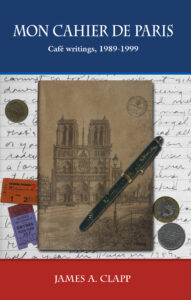
CHAPTER X
THE LAST TIME I SAW PARIS
In the final scene of Bernardo Bertolucci’s The Sheltering Sky (1990), Paul Bowles, the author of the original story is seated in a Tangier café where he greets Kit Moresby (Debra Winger), who has survived a harrowing travel experience in the Maghreb, by asking “are you lost?” She responds “yes.” The film concludes with these words over the aged face and rheumy eyes of the author:
“Because we don’t know when we will die, we get to think of life as an inexhaustible well. Yet everything happens only a certain number of times, and a very small number really. How many more times will you remember a certain afternoon of your childhood, an afternoon that is so deeply a part of your being that you can’t even conceive of your life without it? Perhaps four, five times more, perhaps not even that. How many more times will you watch the full moon rise? Perhaps 20. And yet it all seems limitless.”
Our travels, because they engender a heightened sense of “where and when,” often become among the mnemonic markers of our lives. But each time we re-visit the places of our travels we have a sense of having expended yet another of an unavoidably diminishing and ultimately concluding number of such occasions. There will be, as there is for everyone’s experience with Paris (or anywhere), as there is for everything, a last time. We may not know and, preferring to retain the anticipation of future returns, clinging to the comforts of hope and denial, we may not wish to know which will be our final time.
It might be that, in recognition of such existential realities, many travelers never attempt to repeat or recapture their previous journeys. In his book, Ghost Train to the Eastern Star: On the Tracks of the Great Railway Bazaar (2008), veteran travel writer Paul Theroux, retraces as faithfully as he is able the train trip he took from West to East thirty-three years earlier. In it he remarks that many great travelers never repeated journeys for which they earned their renown as travel writers. Darwin made only the one sea voyage on the Beagle and Conrad ceased going to sea; Captain Sir Richard Burton never went back to confirm the source of the Nile; Graham Greene never returned to Vietnam; and he cites many others.
But how we travel is derivative of the needs and meaning it gives to our lives. I have traveled with others for whom one foreign trip is enough to convince them they never wish to leave home again, and with fewer who are convinced they would be happy never to return home. I have met those who are in constant quest of the discovery of new destinations, and those who, like migratory birds return again and again to the same place. There are those for whom “there” is the essence of travel and those for whom it is the “getting there.” In this way the love of travel is not too dissimilar from the experience of love.
What makes a city not just space, but a “place” is that something has happened there—not just historically epic happenings, but of the most personal and ordinary sort (although the two sorts might well conjoin). As place-conscious beings we remember where we were when something of significance happened to us—that first embrace with her on the Pont Neuf, or it might have been atop the Tour Eiffel, or after that dinner at that bistro in Rue Monge, or when you were both looking at The Raft of the Medusa in the Louvre. Indeed, the romantic soul yearns for the poetic juxtaposition of place and circumstance.
One might therefore be envious of Charles Willis (Van Johnson). In The Last Time I Saw Paris he gets not only to be the love interest of a young and beautiful Helen Ellswirth (Elizabeth Taylor), but he is in Paris at that epic moment of its liberation from the Nazis in late August 1944 (the opposite side of the occupation as the Paris love affair of Rick and Elsa, of whom we might also be envious).
Adapted from F. Scott Fitzegerald’s Babylon Revisited the story opens with the return of Charles, after an absence of two years, to Paris and his favorite bar, the Café Dhingo. In lengthy flashback he reminisces with the bartender about his falling in love with Helen at the end of the war. At that time Charles was an army Lieutenant writing for Stars and Stripes, and Helen, the daughter of an erstwhile wealthy father who seems determined on maintaining man a “lost generation” lifestyle beyond his means, plants a celebratory kiss in his lips in the street and promptly disappear.
Unknowingly, but fortunately, Charles meets Helen’s sister Marion (Donna Reed) in the bar and they form a mutual attraction until, to his surprise, he meets Helen again at the Ellswirth home an his affections are re-directed to the more glamorous sister. Helen, in contrast to both Charles and her level-headed sister, is a fun loving and carefree party girl, like her bon vivant father James Ellswirth (Walter Pidgeon). But opposites attract and, despite that fact that Charles is more serious and has ambitions as a novelist, they marry.
Helen survives a near death experience from pneumonia contracted from being out in the Paris drizzle65 to give birth to their daughter, Vickie. But soon enough the bloom is off the rose of the post-war days; Charles fails to make it as a novelist and, owing to a sudden windfall from oil stock that enriches the Ellswirths, Charles joins in heavy drinking and the dissolute partying ways of his wife and father-in-law. Things go south from there with mutual toying with infidelities by Charles and Helen and, tragically, after getting caught out in the snow, this time Helen dies from pneumonia.
Marion and her father take over care of Vickie and Charles heads back to Milwaukee to try to straighten out his life. It is his return to Paris after five years that takes us back to, the beginning of the story. After some difficulty with Marion who has nursed grudge from being thrown over by him for Helen, Charles manages to retrieve his daughter and they return to America, presumably Milwaukee. Would a writer returns to Paris merely to retrieve his child and return to Milwaukee?
That ending is indicative that, despite the movie’s title, Paris itself has a surprisingly small role to play in this story beyond the days of its liberation and, of course, Jerome Kern’s title song. The locale might just as well been New York in the same time period. There
is no conflation of Paris with the delectable Miss Taylor at age twenty-two, who perhaps looked better to Richard Brooks’ directorial eye than a Paris that had endured the Wehrmacht for several years.
The tragedy of The Last Time I Saw Paris is not one of lost romance, but one of anachronism. Fitzgerald’s story is of the “Jazz Age” in the years following World War I, which raises the question of what the Ellswirth’s, an American family, putatively living a high life on low means, were doing in Paris during the Nazi occupation years.
In its anomalous way The Last Time I Saw Paris confirms Bowles’ rumination on travel: There will be a last time we all see Paris; but what makes our hearts “light and gay” is our anticipation of the next time.
__________________________________________________________________
© 2015, James A. Clapp
